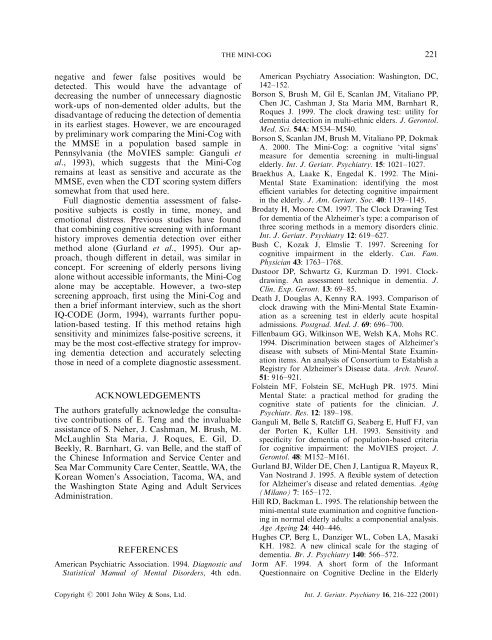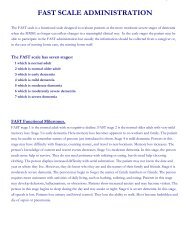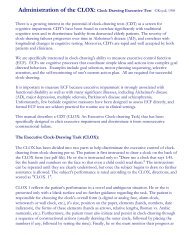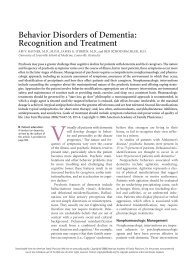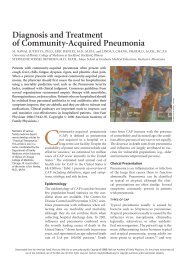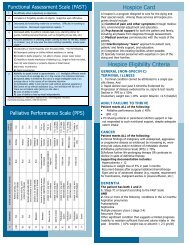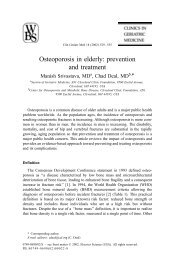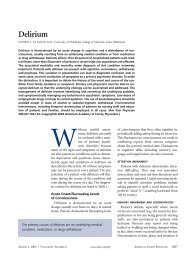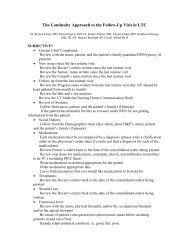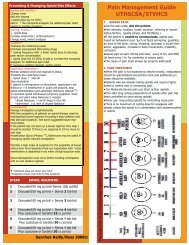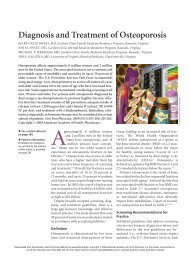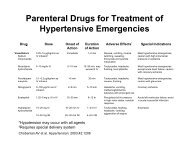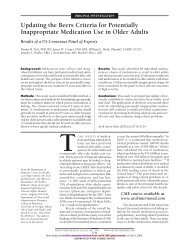the mini-cog - John A. Hartford Center of Excellence in Geriatrics ...
the mini-cog - John A. Hartford Center of Excellence in Geriatrics ...
the mini-cog - John A. Hartford Center of Excellence in Geriatrics ...
Create successful ePaper yourself
Turn your PDF publications into a flip-book with our unique Google optimized e-Paper software.
negative and fewer false positives would be<br />
detected. This would have <strong>the</strong> advantage <strong>of</strong><br />
decreas<strong>in</strong>g <strong>the</strong> number <strong>of</strong> unnecessary diagnostic<br />
work-ups <strong>of</strong> non-demented older adults, but <strong>the</strong><br />
disadvantage <strong>of</strong> reduc<strong>in</strong>g <strong>the</strong> detection <strong>of</strong> dementia<br />
<strong>in</strong> its earliest stages. However, we are encouraged<br />
by prelim<strong>in</strong>ary work compar<strong>in</strong>g <strong>the</strong> M<strong>in</strong>i-Cog with<br />
<strong>the</strong> MMSE <strong>in</strong> a population based sample <strong>in</strong><br />
Pennsylvania (<strong>the</strong> MoVIES sample: Ganguli et<br />
al., 1993), which suggests that <strong>the</strong> M<strong>in</strong>i-Cog<br />
rema<strong>in</strong>s at least as sensitive and accurate as <strong>the</strong><br />
MMSE, even when <strong>the</strong> CDT scor<strong>in</strong>g system di€ers<br />
somewhat from that used here.<br />
Full diagnostic dementia assessment <strong>of</strong> falsepositive<br />
subjects is costly <strong>in</strong> time, money, and<br />
emotional distress. Previous studies have found<br />
that comb<strong>in</strong><strong>in</strong>g <strong>cog</strong>nitive screen<strong>in</strong>g with <strong>in</strong>formant<br />
history improves dementia detection over ei<strong>the</strong>r<br />
method alone (Gurland et al., 1995). Our approach,<br />
though di€erent <strong>in</strong> detail, was similar <strong>in</strong><br />
concept. For screen<strong>in</strong>g <strong>of</strong> elderly persons liv<strong>in</strong>g<br />
alone without accessible <strong>in</strong>formants, <strong>the</strong> M<strong>in</strong>i-Cog<br />
alone may be acceptable. However, a two-step<br />
screen<strong>in</strong>g approach, ®rst us<strong>in</strong>g <strong>the</strong> M<strong>in</strong>i-Cog and<br />
<strong>the</strong>n a brief <strong>in</strong>formant <strong>in</strong>terview, such as <strong>the</strong> short<br />
IQ-CODE (Jorm, 1994), warrants fur<strong>the</strong>r population-based<br />
test<strong>in</strong>g. If this method reta<strong>in</strong>s high<br />
sensitivity and <strong>m<strong>in</strong>i</strong>mizes false-positive screens, it<br />
may be <strong>the</strong> most cost-e€ective strategy for improv<strong>in</strong>g<br />
dementia detection and accurately select<strong>in</strong>g<br />
those <strong>in</strong> need <strong>of</strong> a complete diagnostic assessment.<br />
ACKNOWLEDGEMENTS<br />
The authors gratefully acknowledge <strong>the</strong> consultative<br />
contributions <strong>of</strong> E. Teng and <strong>the</strong> <strong>in</strong>valuable<br />
assistance <strong>of</strong> S. Neher, J. Cashman, M. Brush, M.<br />
McLaughl<strong>in</strong> Sta Maria, J. Roques, E. Gil, D.<br />
Beekly, R. Barnhart, G. van Belle, and <strong>the</strong> sta€ <strong>of</strong><br />
<strong>the</strong> Ch<strong>in</strong>ese Information and Service <strong>Center</strong> and<br />
Sea Mar Community Care <strong>Center</strong>, Seattle, WA, <strong>the</strong><br />
Korean Women's Association, Tacoma, WA, and<br />
<strong>the</strong> Wash<strong>in</strong>gton State Ag<strong>in</strong>g and Adult Services<br />
Ad<strong>m<strong>in</strong>i</strong>stration.<br />
REFERENCES<br />
American Psychiatric Association. 1994. Diagnostic and<br />
Statistical Manual <strong>of</strong> Mental Disorders, 4th edn.<br />
THE MINI-COG 221<br />
American Psychiatry Association: Wash<strong>in</strong>gton, DC,<br />
142±152.<br />
Borson S, Brush M, Gil E, Scanlan JM, Vitaliano PP,<br />
Chen JC, Cashman J, Sta Maria MM, Barnhart R,<br />
Roques J. 1999. The clock draw<strong>in</strong>g test: utility for<br />
dementia detection <strong>in</strong> multi-ethnic elders. J. Gerontol.<br />
Med. Sci. 54A: M534±M540.<br />
Borson S, Scanlan JM, Brush M, Vitaliano PP, Dokmak<br />
A. 2000. The M<strong>in</strong>i-Cog: a <strong>cog</strong>nitive `vital signs'<br />
measure for dementia screen<strong>in</strong>g <strong>in</strong> multi-l<strong>in</strong>gual<br />
elderly. Int. J. Geriatr. Psychiatry. 15: 1021±1027.<br />
Braekhus A, Laake K, Engedal K. 1992. The M<strong>in</strong>i-<br />
Mental State Exam<strong>in</strong>ation: identify<strong>in</strong>g <strong>the</strong> most<br />
e cient variables for detect<strong>in</strong>g <strong>cog</strong>nitive impairment<br />
<strong>in</strong> <strong>the</strong> elderly. J. Am. Geriatr. Soc. 40: 1139±1145.<br />
Brodaty H, Moore CM. 1997. The Clock Draw<strong>in</strong>g Test<br />
for dementia <strong>of</strong> <strong>the</strong> Alzheimer's type: a comparison <strong>of</strong><br />
three scor<strong>in</strong>g methods <strong>in</strong> a memory disorders cl<strong>in</strong>ic.<br />
Int. J. Geriatr. Psychiatry 12: 619±627.<br />
Bush C, Kozak J, Elmslie T. 1997. Screen<strong>in</strong>g for<br />
<strong>cog</strong>nitive impairment <strong>in</strong> <strong>the</strong> elderly. Can. Fam.<br />
Physician 43: 1763±1768.<br />
Dastoor DP, Schwartz G, Kurzman D. 1991. Clockdraw<strong>in</strong>g.<br />
An assessment technique <strong>in</strong> dementia. J.<br />
Cl<strong>in</strong>. Exp. Geront. 13: 69±85.<br />
Death J, Douglas A, Kenny RA. 1993. Comparison <strong>of</strong><br />
clock draw<strong>in</strong>g with <strong>the</strong> M<strong>in</strong>i-Mental State Exam<strong>in</strong>ation<br />
as a screen<strong>in</strong>g test <strong>in</strong> elderly acute hospital<br />
admissions. Postgrad. Med. J. 69: 696±700.<br />
Fillenbaum GG, Wilk<strong>in</strong>son WE, Welsh KA, Mohs RC.<br />
1994. Discrim<strong>in</strong>ation between stages <strong>of</strong> Alzheimer's<br />
disease with subsets <strong>of</strong> M<strong>in</strong>i-Mental State Exam<strong>in</strong>ation<br />
items. An analysis <strong>of</strong> Consortium to Establish a<br />
Registry for Alzheimer's Disease data. Arch. Neurol.<br />
51: 916±921.<br />
Folste<strong>in</strong> MF, Folste<strong>in</strong> SE, McHugh PR. 1975. M<strong>in</strong>i<br />
Mental State: a practical method for grad<strong>in</strong>g <strong>the</strong><br />
<strong>cog</strong>nitive state <strong>of</strong> patients for <strong>the</strong> cl<strong>in</strong>ician. J.<br />
Psychiatr. Res. 12: 189±198.<br />
Ganguli M, Belle S, Ratcli€ G, Seaberg E, Hu€ FJ, van<br />
der Porten K, Kuller LH. 1993. Sensitivity and<br />
speci®city for dementia <strong>of</strong> population-based criteria<br />
for <strong>cog</strong>nitive impairment: <strong>the</strong> MoVIES project. J.<br />
Gerontol. 48: M152±M161.<br />
Gurland BJ, Wilder DE, Chen J, Lantigua R, Mayeux R,<br />
Van Nostrand J. 1995. A ¯exible system <strong>of</strong> detection<br />
for Alzheimer's disease and related dementias. Ag<strong>in</strong>g<br />
(Milano) 7: 165±172.<br />
Hill RD, Backman L. 1995. The relationship between <strong>the</strong><br />
<strong>m<strong>in</strong>i</strong>-mental state exam<strong>in</strong>ation and <strong>cog</strong>nitive function<strong>in</strong>g<br />
<strong>in</strong> normal elderly adults: a componential analysis.<br />
Age Age<strong>in</strong>g 24: 440±446.<br />
Hughes CP, Berg L, Danziger WL, Coben LA, Masaki<br />
KH. 1982. A new cl<strong>in</strong>ical scale for <strong>the</strong> stag<strong>in</strong>g <strong>of</strong><br />
dementia. Br. J. Psychiatry 140: 566±572.<br />
Jorm AF. 1994. A short form <strong>of</strong> <strong>the</strong> Informant<br />
Questionnaire on Cognitive Decl<strong>in</strong>e <strong>in</strong> <strong>the</strong> Elderly<br />
Copyright # 2001 <strong>John</strong> Wiley & Sons, Ltd. Int. J. Geriatr. Psychiatry 16, 216±222 (2001)


